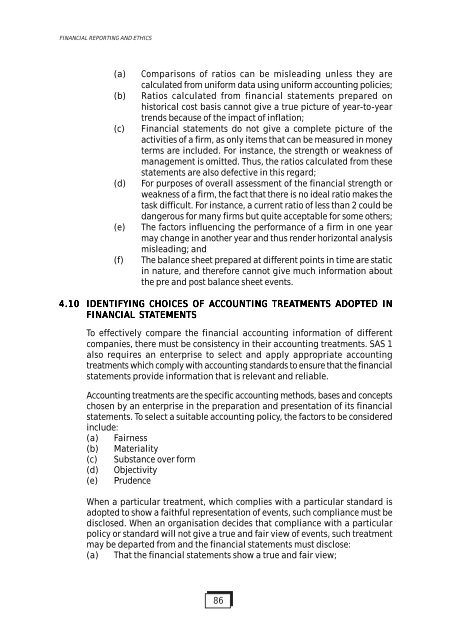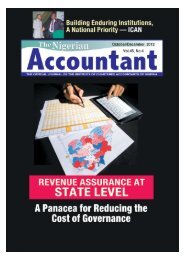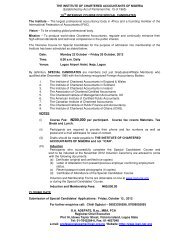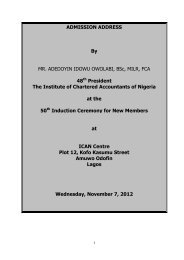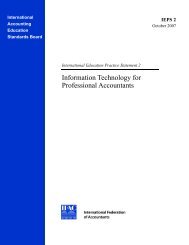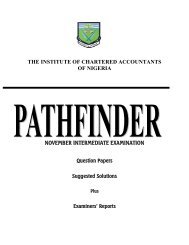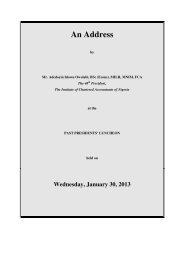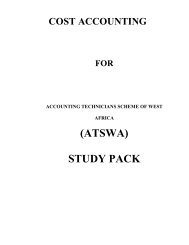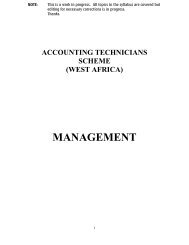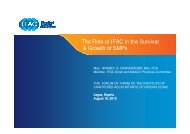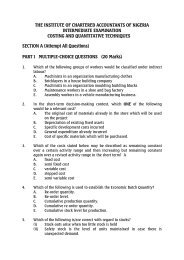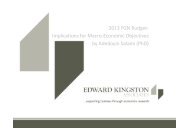- Page 4:
FINANCIAL REPORTING AND ETHICS1.3.3
- Page 11 and 12:
ACCOUNTING AND REPORTING POLICIESsu
- Page 13 and 14:
ACCOUNTING AND REPORTING POLICIES(j
- Page 15 and 16:
ACCOUNTING AND REPORTING POLICIES(i
- Page 17 and 18:
ACCOUNTING AND REPORTING POLICIES2.
- Page 19 and 20:
3AMALGAMATION, ABSORPTION ANDRECONS
- Page 21 and 22:
AMALGAMATION, ABSORPTION AND RECONS
- Page 23 and 24:
AMALGAMATION, ABSORPTION AND RECONS
- Page 25 and 26:
AMALGAMATION, ABSORPTION AND RECONS
- Page 27 and 28:
AMALGAMATION, ABSORPTION AND RECONS
- Page 29 and 30:
AMALGAMATION, ABSORPTION AND RECONS
- Page 31 and 32:
AMALGAMATION, ABSORPTION AND RECONS
- Page 33 and 34:
AMALGAMATION, ABSORPTION AND RECONS
- Page 35 and 36: AMALGAMATION, ABSORPTION AND RECONS
- Page 37 and 38: AMALGAMATION, ABSORPTION AND RECONS
- Page 39 and 40: AMALGAMATION, ABSORPTION AND RECONS
- Page 41 and 42: AMALGAMATION, ABSORPTION AND RECONS
- Page 43 and 44: AMALGAMATION, ABSORPTION AND RECONS
- Page 45 and 46: AMALGAMATION, ABSORPTION AND RECONS
- Page 47 and 48: AMALGAMATION, ABSORPTION AND RECONS
- Page 49 and 50: AMALGAMATION, ABSORPTION AND RECONS
- Page 51 and 52: AMALGAMATION, ABSORPTION AND RECONS
- Page 53 and 54: AMALGAMATION, ABSORPTION AND RECONS
- Page 55 and 56: AMALGAMATION, ABSORPTION AND RECONS
- Page 57 and 58: AMALGAMATION, ABSORPTION AND RECONS
- Page 59 and 60: AMALGAMATION, ABSORPTION AND RECONS
- Page 61 and 62: AMALGAMATION, ABSORPTION AND RECONS
- Page 63 and 64: AMALGAMATION, ABSORPTION AND RECONS
- Page 65 and 66: AMALGAMATION, ABSORPTION AND RECONS
- Page 67 and 68: 4ANALYSIS AND INTERPRETATION TION O
- Page 69 and 70: ANALYSIS AND INTERPRETATION OF FINA
- Page 71 and 72: ANALYSIS AND INTERPRETATION OF FINA
- Page 73 and 74: ANALYSIS AND INTERPRETATION OF FINA
- Page 75 and 76: ANALYSIS AND INTERPRETATION OF FINA
- Page 77 and 78: ANALYSIS AND INTERPRETATION OF FINA
- Page 79 and 80: ANALYSIS AND INTERPRETATION OF FINA
- Page 81 and 82: ANALYSIS AND INTERPRETATION OF FINA
- Page 83 and 84: ANALYSIS AND INTERPRETATION OF FINA
- Page 85: ANALYSIS AND INTERPRETATION OF FINA
- Page 89 and 90: 5ACCOUNTING STANDARDS5.0 LEARNING O
- Page 91 and 92: ACCOUNTING STANDARDS(i)(ii)(iii)(iv
- Page 93 and 94: ACCOUNTING STANDARDSThere is no SAS
- Page 95 and 96: ACCOUNTING STANDARDS5.2.4 Borrowing
- Page 97 and 98: ACCOUNTING STANDARDS(iii)Certain pe
- Page 99 and 100: ACCOUNTING STANDARDSby venture capi
- Page 101 and 102: ACCOUNTING STANDARDSIFRS 7 Financia
- Page 103 and 104: ACCOUNTING STANDARDSactivity, non-c
- Page 105 and 106: ACCOUNTING STANDARDSin the year inc
- Page 107 and 108: ACCOUNTING STANDARDS(v)(vi)(vii)whe
- Page 109 and 110: ACCOUNTING STANDARDS(v)Actions requ
- Page 111 and 112: ACCOUNTING STANDARDSAccounting stud
- Page 113 and 114: 6ETHICAL FRAMEWORK, CONCEPTSAND VAL
- Page 115 and 116: ETHICAL FRAMEWORK, CONCEPTS AND VAL
- Page 117 and 118: ETHICAL FRAMEWORK, CONCEPTS AND VAL
- Page 119 and 120: ETHICAL FRAMEWORK, CONCEPTS AND VAL
- Page 121 and 122: ETHICAL FRAMEWORK, CONCEPTS AND VAL
- Page 123 and 124: ETHICAL FRAMEWORK, CONCEPTS AND VAL
- Page 125 and 126: ETHICAL FRAMEWORK, CONCEPTS AND VAL
- Page 127 and 128: ETHICAL FRAMEWORK, CONCEPTS AND VAL
- Page 129 and 130: ETHICAL FRAMEWORK, CONCEPTS AND VAL
- Page 131 and 132: ETHICAL FRAMEWORK, CONCEPTS AND VAL
- Page 133 and 134: ETHICAL FRAMEWORK, CONCEPTS AND VAL
- Page 135 and 136: ETHICAL FRAMEWORK, CONCEPTS AND VAL
- Page 137 and 138:
ETHICAL FRAMEWORK, CONCEPTS AND VAL
- Page 139 and 140:
ETHICAL FRAMEWORK, CONCEPTS AND VAL
- Page 141 and 142:
ETHICAL FRAMEWORK, CONCEPTS AND VAL
- Page 143 and 144:
ETHICAL FRAMEWORK, CONCEPTS AND VAL
- Page 145 and 146:
ETHICAL FRAMEWORK, CONCEPTS AND VAL
- Page 147 and 148:
7THE ENVIRONMENT: CORPORATE,PROFESS
- Page 149 and 150:
THE ENVIRONMENT: CORPORATE, PROFESS
- Page 151 and 152:
THE ENVIRONMENT: CORPORATE, PROFESS
- Page 153 and 154:
THE ENVIRONMENT: CORPORATE, PROFESS
- Page 155 and 156:
THE ENVIRONMENT: CORPORATE, PROFESS
- Page 157 and 158:
THE ENVIRONMENT: CORPORATE, PROFESS
- Page 159 and 160:
THE ENVIRONMENT: CORPORATE, PROFESS
- Page 161 and 162:
THE ENVIRONMENT: CORPORATE, PROFESS
- Page 163 and 164:
THE ENVIRONMENT: CORPORATE, PROFESS
- Page 165 and 166:
THE ENVIRONMENT: CORPORATE, PROFESS
- Page 167 and 168:
THE ENVIRONMENT: CORPORATE, PROFESS
- Page 169 and 170:
THE ENVIRONMENT: CORPORATE, PROFESS
- Page 171 and 172:
8PROFESSIONAL ETHICS8. 0 LEARNING O
- Page 173 and 174:
PROFESSIONAL ETHICSobjectivity are
- Page 175 and 176:
PROFESSIONAL ETHICS(c)(d)The type o
- Page 177 and 178:
PROFESSIONAL ETHICSabout conflicts
- Page 179 and 180:
PROFESSIONAL ETHICS(d)(e)Confidenti
- Page 181 and 182:
PROFESSIONAL ETHICSA. III onlyB. II
- Page 183 and 184:
9DECISION MAKING IN ETHICS9. 0 LEAR
- Page 185 and 186:
DECISION MAKING IN ETHICS9.2 A FRAM
- Page 187 and 188:
ETHICAL THREATS AND SAFEGUARDS(d)We
- Page 189 and 190:
DECISION MAKING IN ETHICS4. A perso
- Page 191 and 192:
10ETHICAL THREATS TS AND SAFEGUARDS
- Page 193 and 194:
ETHICAL THREATS AND SAFEGUARDS(iv)(
- Page 195 and 196:
ETHICAL THREATS AND SAFEGUARDSto th
- Page 197 and 198:
ETHICAL THREATS AND SAFEGUARDSpayab
- Page 199 and 200:
ETHICAL THREATS AND SAFEGUARDS(a)Fi
- Page 201 and 202:
ETHICAL THREATS AND SAFEGUARDSimmin
- Page 203 and 204:
ETHICAL THREATS AND SAFEGUARDSHowev
- Page 205 and 206:
ETHICAL THREATS AND SAFEGUARDS(iii)
- Page 207 and 208:
11CORPORATE GOVERNANCE11.0 LEARNING
- Page 209 and 210:
CORPORATE GOVERNANCE11.3.1 Nature(a
- Page 211 and 212:
CORPORATE GOVERNANCEThe company sho
- Page 213 and 214:
CORPORATE GOVERNANCEtrust, possible
- Page 215 and 216:
CORPORATE GOVERNANCEAn agent has im
- Page 217 and 218:
CORPORATE GOVERNANCE(a)(b)(c)(d)(e)
- Page 219 and 220:
CORPORATE GOVERNANCE11.6.1 The law
- Page 221 and 222:
CORPORATE GOVERNANCEILLUSTRAUSTRATI
- Page 223 and 224:
CORPORATE GOVERNANCEimitated. They
- Page 225 and 226:
CORPORATE GOVERNANCE(a)(b)Greenbury
- Page 227 and 228:
CORPORATE GOVERNANCE11.9.2 Boards d
- Page 229 and 230:
CORPORATE GOVERNANCErelationship wi
- Page 231 and 232:
CORPORATE GOVERNANCE(e)(f)(g)(h)(i)
- Page 233 and 234:
CORPORATE GOVERNANCE(vi)Inquisitive
- Page 235 and 236:
CORPORATE GOVERNANCE(e)ConsultancyA
- Page 237 and 238:
CORPORATE GOVERNANCEThe incoming au
- Page 239 and 240:
CORPORATE GOVERNANCEIn summary, acc
- Page 241 and 242:
CORPORATE GOVERNANCEAccording to Th
- Page 243 and 244:
CORPORATE GOVERNANCE3. A body corpo
- Page 245 and 246:
12SOCIAL AND ENVIRONMENTALISSUES IN
- Page 247 and 248:
SOCIAL AND ENVIRONMENTAL ISSUES IN
- Page 249 and 250:
SOCIAL AND ENVIRONMENTAL ISSUES IN
- Page 251 and 252:
SOCIAL AND ENVIRONMENTAL ISSUES IN
- Page 253 and 254:
SOCIAL AND ENVIRONMENTAL ISSUES IN
- Page 255 and 256:
SOCIAL AND ENVIRONMENTAL ISSUES IN
- Page 257 and 258:
SOCIAL AND ENVIRONMENTAL ISSUES IN
- Page 259 and 260:
SOCIAL AND ENVIRONMENTAL ISSUES IN
- Page 261 and 262:
SOCIAL AND ENVIRONMENTAL ISSUES IN
- Page 263 and 264:
APPENDIX ISUGGESTED SOLUTIONS TO RE
- Page 265 and 266:
SUGGESTED SOLUTIONS TO REVISION QUE
- Page 267 and 268:
SUGGESTED SOLUTIONS TO REVISION QUE
- Page 269 and 270:
APPENDIX IICOMPREHENSIVE QUESTIONS
- Page 271 and 272:
COMPREHENSIVE QUESTIONS AND SUGGEST
- Page 273 and 274:
COMPREHENSIVE QUESTIONS AND SUGGEST
- Page 275 and 276:
COMPREHENSIVE QUESTIONS AND SUGGEST
- Page 277 and 278:
APPENDIX IIICASE STUDY 1Karsashi, a
- Page 279 and 280:
CASE STUDIES(iii)(iv)The floor sale
- Page 281 and 282:
CASE STUDIESShare price and dividen
- Page 283 and 284:
CASE STUDIESSUGGESTED SOLUTION(A) A
- Page 285 and 286:
CASE STUDY 3The following informati
- Page 287 and 288:
CASE STUDIESCASE STUDY 4Ologobojo i
- Page 289 and 290:
APPENDIX IVTable 1:SUMMARY OF INTER
- Page 291 and 292:
SUMMARY OF INTERNATIONAL ACCOUNTING
- Page 293 and 294:
APPENDIX VGLOSSARY OF TERMSAbsorpti
- Page 295 and 296:
GLOSSARY OF TERMSEthical Objectivis
- Page 297 and 298:
APPENDIX VIBIBLIOGRAPHYChambers Ham
- Page 299 and 300:
APPENDIX VIISTUDY AND EXAMINATION T
- Page 301 and 302:
STUDY AND EXAMINATION TECHNIQUES7.3
- Page 303 and 304:
INDEXAAbsorption, 17, 19, 39, 40, 4
- Page 305 and 306:
INDEXProfessional Behaviour, 136, 1
- Page 307 and 308:
307
- Page 309:
309


